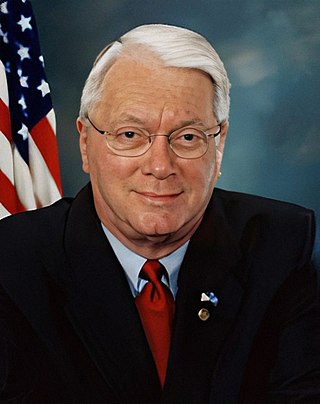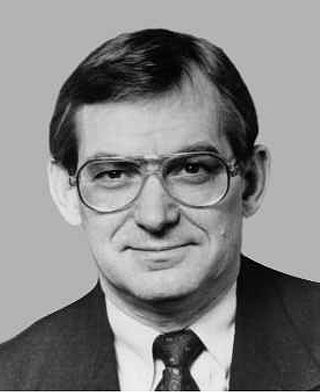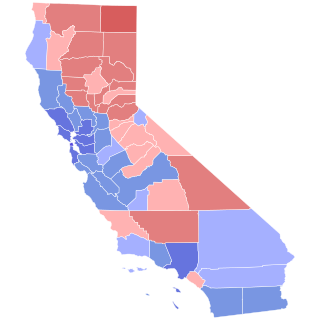
James Paul David Bunning was an American professional baseball pitcher and politician who represented Kentucky in both chambers of the United States Congress. He was the sole Major League Baseball athlete to have been elected to both the United States Senate and the National Baseball Hall of Fame.

Anne Meagher Northup is an American Republican politician and educator from the Commonwealth of Kentucky. From 1997 to 2007, she represented the Louisville-centered 3rd congressional district of Kentucky in the United States House of Representatives, where she served on the powerful House Appropriations Committee. She lost reelection to Democrat John Yarmuth in the 2006 election. She then ran for Governor of Kentucky, losing by 15 points to embattled governor Ernie Fletcher in the Republican primary election for the 2007 Kentucky gubernatorial election. Prior to her election to the United States House of Representatives, Northup had served in the Kentucky House of Representatives. Northup ran again for her old congressional seat in the 2008 election, losing again to Yarmuth.

The 2002 United States Senate elections featured a series of fiercely contested elections that resulted in a victory for the Republican Party, which gained two seats and thus a narrow majority from the Democratic Party in the United States Senate. The Senate seats up for election, known as class 2 Senate seats, were last up for regular election in 1996. The election cycle was held on November 5, 2002, almost fourteen months after the September 11, 2001 attacks.

The 1998 United States Senate elections were held on November 3, with the 34 seats of Class 3 contested in regular elections. This was seen as an even contest between the Republican Party and Democratic Party. While the Democrats had to defend more seats up for election, Republican attacks on the morality of President Bill Clinton failed to connect with voters and anticipated Republican gains did not materialize. The Republicans picked up open seats in Ohio and Kentucky and narrowly defeated Democratic incumbent Carol Moseley Braun (Illinois), but these were cancelled out by the Democrats' gain of an open seat in Indiana and defeats of Republican Senators Al D'Amato and Lauch Faircloth. The balance of the Senate remained unchanged at 55–45 in favor of the Republicans.

The 2008 United States Senate elections were held on November 4, 2008, with 35 of the 100 seats in the Senate being contested. Thirty-three seats were up for regular elections; the winners were eligible to serve six-year terms from January 3, 2009, to January 3, 2015, as members of Class 2. There were also two special elections, the winners of those seats would finish the terms that ended on January 3, 2013. The presidential election, which was won by Democrat Barack Obama, elections for all House of Representatives seats; elections for several gubernatorial elections; and many state and local elections occurred on the same date.

Henry Scott Baesler is an American Democratic politician and former Representative from the Commonwealth of Kentucky.

United States gubernatorial elections were held on November 4, 2008, in 11 states and two territories. Prior to the election, eight of the total seats were held by Democrats and five by Republicans. Two governors were prohibited by term limits from seeking re-election in 2008. The only governorship to change party was the open seat in Missouri, which was won by a Democrat after being previously held by a Republican.

The United States Senate election in New Hampshire was held on November 4, 2008. Incumbent Republican U.S. Senator John E. Sununu ran for re-election to a second term, but was defeated by Democrat Jeanne Shaheen in a rematch of the 2002 election. Shaheen's win marked the first time since 1972 that Democrats won this seat, and made her the first Democratic Senator elected from New Hampshire since John A. Durkin's victory in 1975.

The Kentucky Democratic Party is the affiliate of the Democratic Party in the U.S. state of Kentucky. It is currently the minority party in the state, as the rival Republican Party of Kentucky overwhelmingly dominates in the state legislature, congressional delegation, and presidential elections. However, the party does currently control the governorship and lieutenant governorship, and maintains some strength in local elections.

The 2004 United States Senate election in Kentucky took place on November 2, 2004 alongside other elections to the United States Senate in other states as well as elections to the United States House of Representatives and various state and local elections. Incumbent Republican U.S. Senator Jim Bunning narrowly won re-election to a second term over Democratic State Senator Daniel Mongiardo. This election was the first time since 1962 that the incumbent Republican Senator was re-elected or won re-election for this seat.

The 2000 U.S. Senate election in California was held on November 7, 2000. Incumbent Democratic U.S. Senator Dianne Feinstein won re-election to her second full term.

The 2002 United States elections were held on November 5, in the middle of Republican President George W. Bush's first term. Republicans won unified control of Congress, picking up seats in both chambers of Congress, making Bush the first President since Franklin D. Roosevelt in 1934 to gain seats in both houses of Congress. In the gubernatorial elections, Democrats won a net gain of one seat. The elections were held just a little under fourteen months after the September 11 attacks. Thus, the elections were heavily overshadowed by the War on Terror, the impending Iraq War, the early 2000s recession, and the sudden death of Democratic Senator Paul Wellstone of Minnesota about one week before the election.

The 2004 United States Senate election in Colorado took place on November 2, 2004 alongside other elections to the United States Senate in other states as well as elections to the United States House of Representatives and various state and local elections. Incumbent Republican U.S. Senator Ben Nighthorse Campbell decided to retire instead of seeking a third term. Democratic nominee Ken Salazar won the open seat, defeating Republican nominee Pete Coors.

The 2010 United States Senate election in Kentucky took place on November 2, 2010, alongside other elections to the United States Senate in other states as well as elections to the United States House of Representatives and various state and local elections. Primaries for each respective party were held on May 18, 2010. Incumbent Republican U.S. Senator Jim Bunning decided to retire instead of seeking a third term. Republican nominee Rand Paul, an ophthalmologist and son of Congressman Ron Paul, won the open seat against Kentucky Attorney General Jack Conway.

The 1996 United States Senate special election in Oregon was held on January 30, 1996 to fill the seat vacated by Republican Bob Packwood, who had resigned from the Senate due to sexual misconduct allegations.

The 2000 United States Senate election in Vermont took place on November 7, 2000. Incumbent Republican U.S. Senator Jim Jeffords won re-election to a third term in office. In May 2001, Jeffords left the Republican Party and announced that he would become an independent who would caucus with the Democratic Party. His party exit broke the 50–50 lock in the Senate and effectively gave the Democrats the majority. Thus, that switch marked the first time since 1855 that Vermont had no Republicans in its entire congressional delegation.

The 1994 United States Senate election in Arizona was held November 8, 1994. Incumbent Democratic U.S. Senator Dennis DeConcini decided to retire instead of seeking a fourth term. Republican nominee Jon Kyl won the open seat, becoming the first Republican to win Arizona's Class 1 Senate seat since Paul Fannin in 1970. Democrats would not win this seat again, or any Senate race in the state, until Kyrsten Sinema's victory in 2018.

The 1994 U.S. Senate election in Vermont was held, where incumbent centrist Republican senator Jim Jeffords won re-election to a second term against state senator Jan Backus and independent Gavin Mills. He won every county in the state.

The 1994 United States Senate election in Montana was held November 8, 1994 to select the U.S. Senator from the state of Montana. Incumbent U.S. Senator Conrad Burns won re-election to a second term. This was the first time a Republican senator ever won re-election in Montana.

The 1992 United States Senate election in Idaho took place on November 3, 1992, alongside other elections to the United States Senate in other states as well as elections to the United States House of Representatives and various state and local elections. Incumbent Republican U.S. Senator Steve Symms decided to retire instead of seeking a third term. Republican nominee and Boise mayor Dirk Kempthorne won the open seat, defeating Democratic Congressman Richard H. Stallings.





















